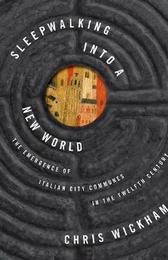
|
Sleepwalking into a New World: The Emergence of Italian City Communes in the Twelfth Century
Paperback / softback
Main Details
| Title |
Sleepwalking into a New World: The Emergence of Italian City Communes in the Twelfth Century
|
| Authors and Contributors |
By (author) Chris Wickham
|
| Series | The Lawrence Stone Lectures |
|---|
| Physical Properties |
| Format:Paperback / softback | | Pages:320 | | Dimensions(mm): Height 216,Width 140 |
|
| ISBN/Barcode |
9780691181141
|
| Classifications | Dewey:945.03 |
|---|
| Audience | | Postgraduate, Research & Scholarly | |
|---|
| Illustrations |
7 maps.
|
|
Publishing Details |
| Publisher |
Princeton University Press
|
| Imprint |
Princeton University Press
|
| Publication Date |
19 June 2018 |
| Publication Country |
United States
|
Description
A bold new history of the rise of the medieval Italian commune Amid the disintegration of the Kingdom of Italy in the eleventh and twelfth centuries, a new form of collective government-the commune-arose in the cities of northern and central Italy. Sleepwalking into a New World takes a bold new look at how these autonomous city-states came about
Author Biography
Chris Wickham is professor emeritus of medieval history at the University of Oxford.
Reviews"Wickham's expert analysis and meticulous academic approach build on previous. Limited examinations and substantial documentation to turn established research on its head, as he presents a fresh look into how communes in the mid-12th century successfully prepared Italian power structures for the cultural significance they would later have." * Publishers Weekly * "Wickham's analysis is meticulous and incisive, and he situates his conclusions clearly in light of the prior historiography." * Choice * "Wickham's passion for medieval Italian urban history comes across on every page."---Corinne Wieben, H-Net Reviews "This book provides a useful foray into the internal debates occurring in those movements and thus lends layers of complexity to the overall argument."---Brooke Sherrard, Nova Religio "Wickham has a deep knowledge of the previous literature in the topic and an awareness of how this is linked to debates with broad ideological implications, such as the origins of Renaissance and of Republican forms of government and values."---Michele Campopiano, Catholic Historical Review
|